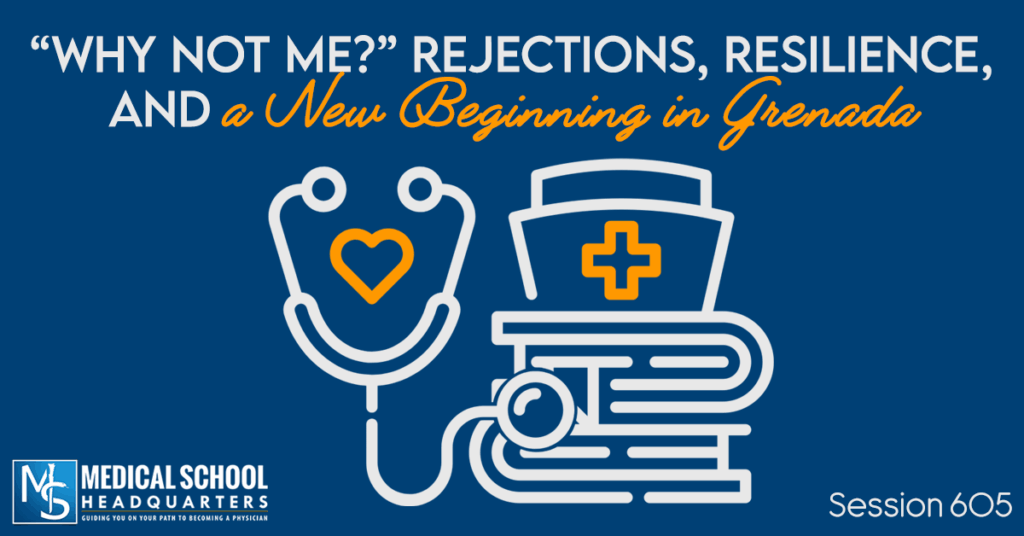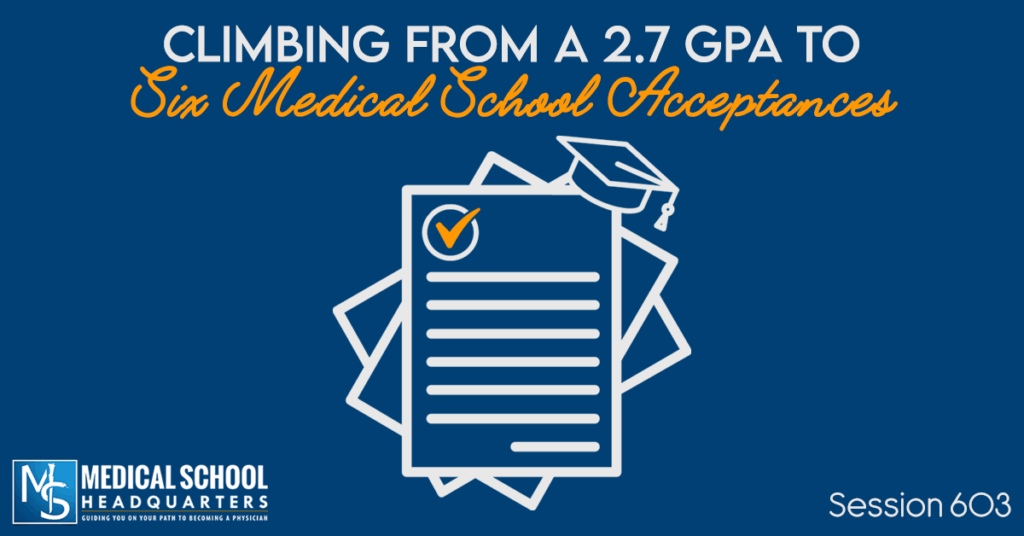Whether you’re rejected from a few medical schools or all that you applied to, each rejection can be a blow to your self-esteem. If you get to the end of the application cycle without an acceptance, it can feel like a sign saying you’ll NEVER become a doctor. That’s almost certainly not true. It does mean that you won’t be a doctor yet. Take this as an opportunity to reflect on your application and what you can do differently next time.
Take your application apart step by step, reflecting at each stage on how you can improve that area in the future. You can also acknowledge things you’ve done well because those skills may be beneficial in other areas of your application. If you need help assessing your application, reach out to someone who knows the process and will give you an honest evaluation. If you don’t have someone like that, our series Application Renovation can help you understand what to look for and point out common mistakes you might’ve also made in your application.
Stats
Your GPA and MCAT are accessible places to start your self-assessment. Don’t fall into the trap, though, of thinking any one number will either gain you an acceptance or guarantee rejection. There are numbers (and the stories behind them) that will open doors and numbers that will close doors. While assessing your grades and MCAT score, look at the most recent data for all matriculating medical students instead of focusing on any one school. Even schools that look at everyone might sort by stats and have run out of interview spots by the time they get to a student with lower stats. An excellent overall MCAT score with a very low section score (123 or lower) might also be a red flag to a school. Go through your application with a fine-tooth comb, looking for potential issues.
Grade Repair
It can be tempting to ignore or just live with a lower GPA since repairing it will take time. Completing a postbac, whether through a formal program or not, can take a year or two. You have many options for completing a postbac, and it’s a good idea to do some research on what’s available to you if your grades may be holding you back. Check out our podcast episode on everything you kneed to know about postbac programs: Postbacs 101: Everything You Need to Know Before Choosing a Program. A good rule of thumb is that if your grades need work, you want to have 30-60 credits of as close to a 4.0 as possible. This will show schools you’re academically capable, even if your actual GPA doesn’t change much.
It’s okay to need a long road to success if it means you still reach your goals by the end of the road. You can hear about James’ long journey to a medical school acceptance in Session 450 of the Premed years. His journey involved a lot of grade recovery and making up for past mistakes. If you have bumps in your road, you, too, can get past them and become a physician.
Activities and Experiences
Even if your grades make the cut, an easy way to evaluate students’ preparedness for medical school is by looking at their extracurriculars. A lack of clinical experience may be an obvious sign that you haven’t done the work. Many short-lived activities in each “expected” category can also come across as if you were going down the list of what you should do and not committing yourself to make sure medicine is the right path for you.
Lackluster activity descriptions aren’t a red flag per se, but they won’t help your application either. The reviewer will not be able to connect with you enough to get to the point of wanting to talk to you and continue learning about your journey. This connection is what brings you interview invites, not your grades. A lack of experience or descriptions that fall flat is a common reason for rejection. These same issues can show in your personal statement, hurting your application in multiple places.
Personal Statement
Reread your personal statement looking for obvious issues like typos and mistakes and the overall quality. The critical thing to keep in mind at this step is whether you answered the actual question you’re being asked: Why medicine? You’re not being asked to prove why you, in particular, are a good candidate. You’re just being asked to show that you know this is the right field for you, and you have the experiences and reflection to back it up.
Look for whether you wrote about your experiences’ impact on you and not just what you physically did. This will show that you understand why you did something and learned from it. Don’t try to sell yourself and explain how your experiences will make you a great physician. Whatever medical school you attend can teach you the skills to be a good physician. At this stage, they’re concerned with your ability to make it to that point academically and through your strength and commitment. For an example of a personal statement that fell short and advice on correcting it, watch this episode of Application Renovation.
If you reapply, you’ll need to rewrite your personal statement, even if it was decent. Hopefully, you’ll have gained more experience in the interim and have new things to talk about or a new perspective on your journey. For help reflecting on and eventually rewriting your personal statement, check out The Premed Playbook Guide to the Medical School Personal Statement.
Application Timing
One of the most common mistakes premeds make when applying is submitting too late. Don’t submit a rushed application full of mistakes just to submit early, but at the same time, don’t submit late because you’re agonizing over every tiny detail. Your application will never be perfect. It needs to be as good as you can make it within a reasonable time frame. Plan to be early by starting your personal statement in January of the year you apply, taking the MCAT by March or April, and prewriting your secondary essays. Then, if you need to delay by a week to a month for it to be good enough or be ready for the MCAT, do that. Since you planned to be as early as possible, a delay will still mean being early in the grand scheme of things.
These are just the most significant potential areas for improvement. For a full breakdown of how to evaluate your application and what to do if you need to reapply, read the final section of The Premed Playbook Guide to the Medical School Application Process.
Apply to be on Application Renovation






